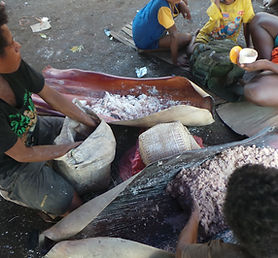i acknowledge the custodians of the lands i work and live on, the Gadigal people of the Eora Nation and the Darramuragal people of the Darug nation
i offer my respects to their elders past, present, and emergent, and to their kin - human, vegetal, animal, and elemental
the lands of Gadigal and Darramuragal were taken without consent, treaty, or compensation
they are lands whose stories have historically been stolen, silenced, and sanitized
they are lands of ongoing Indigenous survivance, continuance, and resurgence
Indigenous lands - always have been, always will be

projects
click the tabs below to find out more about my current research projects

plants and people
A project exploring how deforestation and agribusiness expansion reconfigure plant-human relations in West Papua.

hunger and culture
A project exploring the politics and poetics of hunger among food-insecure communities in Indonesian West Papua.

multispecies justice
An interdisciplinary project exploring the forms and possibilities of justice for human and other-than-human lifeforms.
kangaroos and humans
A project exploring the ethical, ecological, and economic entanglements of humans and kangaroos in Australia.

plants and people
Palm oil is one of just four commodities driving the majority of tropical deforestation and the second largest driver of global warming after beef production. But how is oil palm, as plant and product, understood by indigenous peoples in the places where it is introduced and cultivated? How might indigenous views of this proliferating plant shed light on larger questions about the relationship between human and other-than-human life? Drawing on eighteen months of fieldwork in the West Papuan district of Merauke, this project explores how oil palm’s arrival reconfigures the landscape, interspecies relations, notions of time, and dream experiences of indigenous Marind communities. It situates the social and environmental transformations wrought by deforestation and monocrop expansion in the context of West Papua’s violent and volatile history of political colonization, ethnic domination, and capitalist incursion. Working with and across species categories and hierarchies, the project analyzes how the proliferation of industrial monocrops subverts the futures and relations of some lifeforms while opening new horizons of possibility for others. Taking oil palm as its central protagonist, this project makes a contribution to our understanding of changing plant-human relations in an age of rampant ecological destruction.
A project supported by the Wenner-Gren Foundation for Anthropological Research (Dissertation Fieldwork Grant, Engagement Grant, and Post-PhD Research Grant).
click here to read an article on plant-human relations in West Papua

multispecies justice
This interdisciplinary project explores what it would mean to reconceptualize, reimagine and reinstitute justice through a multispecies lens. It brings together academics, activists, and artists, and seeks to move beyond anthropocentric and Eurocentric framings of justice. We are interested in the lifeworlds of Indigenous peoples and the urban poor who often live with environmental injustice—experiencing unequal suffering from biodiversity loss, resource extraction, toxic exposures, and atmospheric changes. The aim of the project is to generate diffraction patterns--glimmers of possible futures--with new and interdisciplinary knowledge in cultural theory and multispecies studies. We hope to contribute to a growing body of literature in multispecies studies that is informed by the situated knowledge of Indigenous peoples and postcolonial intellectuals. In doing so, we want to offer a counterpoint to prevailing approaches for reimagining and redefining what is possible in multispecies worlds, that have largely been situated in the unmarked white space of Euro-American settler colonialism. As we consider the promissory nature of justice, we will tack back and forth between descriptions of present conditions of life, and speculation about the future to come.
A project supported by the Australian Research Council (Discovery Project).
click here to watch a podcast on multispecies justice

hunger and culture
We live in an era of troubled food systems. Climate change and increasing climate variability and extremes are affecting agricultural productivity, food production and natural resources, with detrimental impacts on food systems and rural livelihoods. Changes in the way food is produced, distributed and consumed worldwide pose different kinds of nutrition and health threats to populations across the Global North and South. This interdisciplinary project examines the poetics and politics of hunger among indigenous West Papuan communities whose traditional foodways are threatened by large-scale deforestation and industrial agribusiness expansion. Pushing against the sanitized language of “food insecurity” in policy and biomedical discourse, the project focuses on hunger as a lived, sensory experience, imbued with contested moral, political, and affective significance for those subjected to its deleterious effects. Weaving Indigenous theories of hunger with insights from anthropology, phenomenology, the environmental humanities, cultural theory, food studies, and Science and Technology Studies, the project seeks to reframe hunger as a multiple, more-than-human, modality of being – one no less cultural than food itself.
A project supported by the Wenner-Gren Foundation (Post-PhD Research Grant).
Native to the continent, targeted as a pest and exploited for its meat and hide, the kangaroo occupies a unique position in Australian social, ecological and economic imaginaries. Yet Australia’s relationship to its national emblem is fraught with complexity. Contestations over this interspecies relation emerge most explicitly in the context of kangaroo culling, conservation and consumption, and their seemingly irreconcilable ethical, economic and environmental dimensions. The goal of this project is to explore the various perceptions, knowledges and practices shaping kangaroo-human relations in Australia, and to produce inter-disciplinary knowledge that will enable more inclusive and equitable human-wildlife futures. Its aims are: 1. To investigate how industry, government, scientific, agriculturalist and animal welfare organisations conceptualize kangaroos as native species and pest, food resource and political symbol,; 2. To analyse how knowledge about kangaroos and their relations to humans and ecosystems is produced, communicated, popularized and contested by diverse sectors of Australian society; 3. To develop new inter-disciplinary and multi-stakeholder approaches for reconciling economic interests and environmental preservation with the ethical treatment of wildlife.
A project supported by the Australian Research Council (Discovery Early Career Researcher Award).
click here to read an article on human-kangaroo relations in Australia

